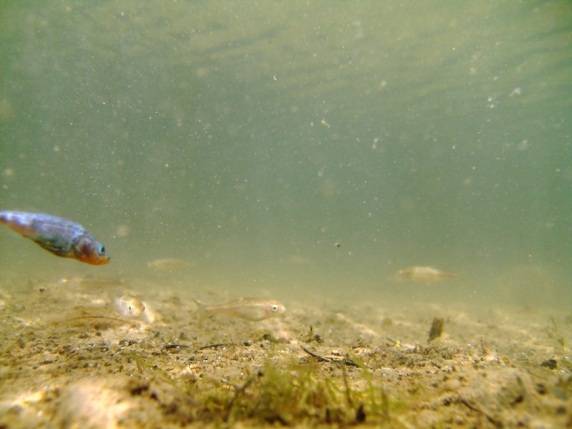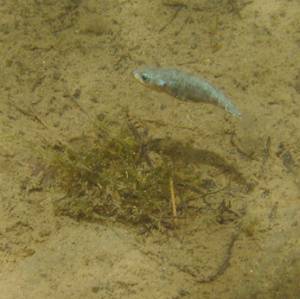
The river is quiet, serene, not a ripple on the surface. Below, a small fish, his eyes shining blue and his throat bright red (all the better to impress the ladies) diligently fans his eggs with his fins, providing fresh water and with it, life-giving oxygen. His nest has been carefully constructed with algae, leaves, and glue, and inside, the eggs that the female laid (before leaving forever) need care and protection. Suddenly, he pauses, alert. A sculpin, that ugly toad-faced fish, has approached the precious nest. In a second, everything changes: the male breaks from his fanning, lunging forward. The sculpin could swallow the male in one gulp; his mouth opens wide as he thrashes toward the nest and the delicious meal within. The male darts, stabs, risking his own life as he bites at the sculpin’s eyes and gills, the most vulnerable parts. The sculpin is surprised and retreats, defeated. After a few seconds, the father turns his attention back to his nest, resuming his fanning. The embryos tumble in their jellied spheres, unaware of the terrible end they have just been spared, unaware that they have been changed forever. The surface of the river remains still, peaceful, broken only by the scratching of my pencil on paper and the occasional burp of a toad. I hand the wire cage containing the sculpin to one of my undergraduate assistants; that wraps it up for today.
When people think of parents, we tend to think of humans or other mammals, or maybe birds feeding their young at the nest. Primarily in animals, but also to an extent in humans, there is much emphasis on the importance of genes, the blueprint that builds your physical appearance and even aspects of your personality. However, more and more we are finding that your parent’s behavior has important consequences for what makes you, well, you. Absolutely love bananas? This might be the result of your mother craving bananas while she was pregnant. Are you easily stressed out, or do you handle difficult situations without your blood pressure rising? You guessed it, how you respond to stress is linked to how much stress your mom experienced when she was pregnant.
Many people, scientist or not, are intrigued by the way in which parents influence their offspring. In humans, however, we cannot easily test these ideas; after all, we can’t control for many different factors, such as human society and culture. But parenting is found throughout the animal kingdom, sometimes where you least expect it: insect parents work together to farm food for their offspring; some lizards pair off for life; and in most species of fish, it is the father that provides all the parental care. It’s easy to imagine how a mother might change her baby’s physical appearance and behavior; she has a direct link to the growing fetus or developing egg. Because of this, there is lots of focus on the importance of moms, in both humans and animals. But what about the dads? Do all dads parent in the same way? Do dads influence their kids in the same way as moms do?

I am in the Navarro River, a winding river in Northern California’s redwood country, trying to answer some of these questions. In this flat stretch of serene river, major drama is happening a mere six inches below the surface. I study the threespine stickleback, a small fish only an inch and a half long that looks kind of like a dinosaur: covered in bony plates, three spines that can lay flat or stick straight up along its back, two spines that can flip straight out to the sides. The dads do all the work here. They develop bright blue eyes and a deep red throat to attract females. After building a nest, they dance in zigzags to show off their hard work. Some males are more ostentatious than others, dancing out in the open; others have a shier personality and will only zigzag a few times near their nest. If a female is impressed, she will come over, lay eggs in the nest, and leave. The male is now responsible for caring for the eggs and guarding the nest from predators and rival males, who will sometimes steal eggs to seem like a more attractive prospect. I am here today to see if males with different personalities respond to threats to their offspring in different ways.
 Wait, personality? In a tiny fish? As it turns out, there is evidence of personality in almost every animal imaginable, from spiders to frogs to birds and even, yes, to fish. What do we mean by personality? Well, as anybody who has ever had a dog or cat can tell you, individual animals differ from one another: perhaps you had a cat that was very shy, or a dog that was friendly to everyone no matter the situation. These consistent individual differences are termed “personality.” Imagine, now, a fish that is aggressive in every situation. This is really helpful when defending a territory, but perhaps isn’t so great when trying to court a female, and is downright dangerous when encountering a predator. I have long been interested in the study of animal personality, because it can lead to these dangerous behaviors where we would expect animals to try and behave optimally in every situation, including something as important as parenting. In my research at the University of Illinois, I found that threespine stickleback dads in the laboratory consistently differed in how they parent: some were duds, some were attentive to their babies no matter what, even when a (fake) predator is in the vicinity. This didn’t have anything to do with how big they were, or how many eggs they had; it appears that differences in parenting are intrinsic to the individuals. How good of a parent you are also matters to your offspring: when we showed the babies a fake predator, the amount of antipredator behavior they performed depended not only on whom their father was, but also how their father responded to a fake predator during parenting. That is, how a dad responds to a threat while he is parenting can help his offspring survive in a world with that threat, even though the offspring were merely embryos at the time. Dads do matter! But the lab is artificial, safe, with no consequences for failure to protect against a rubber predator. How do these patterns play out in the wild? Is a dad that is a highly attentive parent less attentive to the rest of his environment? Do those “duds” make up for it by more vigorously defending their kids?
Wait, personality? In a tiny fish? As it turns out, there is evidence of personality in almost every animal imaginable, from spiders to frogs to birds and even, yes, to fish. What do we mean by personality? Well, as anybody who has ever had a dog or cat can tell you, individual animals differ from one another: perhaps you had a cat that was very shy, or a dog that was friendly to everyone no matter the situation. These consistent individual differences are termed “personality.” Imagine, now, a fish that is aggressive in every situation. This is really helpful when defending a territory, but perhaps isn’t so great when trying to court a female, and is downright dangerous when encountering a predator. I have long been interested in the study of animal personality, because it can lead to these dangerous behaviors where we would expect animals to try and behave optimally in every situation, including something as important as parenting. In my research at the University of Illinois, I found that threespine stickleback dads in the laboratory consistently differed in how they parent: some were duds, some were attentive to their babies no matter what, even when a (fake) predator is in the vicinity. This didn’t have anything to do with how big they were, or how many eggs they had; it appears that differences in parenting are intrinsic to the individuals. How good of a parent you are also matters to your offspring: when we showed the babies a fake predator, the amount of antipredator behavior they performed depended not only on whom their father was, but also how their father responded to a fake predator during parenting. That is, how a dad responds to a threat while he is parenting can help his offspring survive in a world with that threat, even though the offspring were merely embryos at the time. Dads do matter! But the lab is artificial, safe, with no consequences for failure to protect against a rubber predator. How do these patterns play out in the wild? Is a dad that is a highly attentive parent less attentive to the rest of his environment? Do those “duds” make up for it by more vigorously defending their kids?
We are packing up for the day, talking about nothing in particular. We stack up the buckets, wrap up the wire “shark cage” (so-called because they lower the intruders into enemy territory), and collect our notebooks and nets. We have been here for two weeks, watching individual males for three days in a row, observing their parental care and exposing them to females, rival males, and predators to record their reactions. We have just finished the third day for three males, and started observing five more. It’s looking good! We had thought that males that were very attentive to their babies would not be attentive to their surroundings, but we are finding the opposite. It appears that there are some “superdads,” individuals that are able to do it all: parent at high levels, court females, defend their territory, and defend their offspring from predators.
Suddenly, there is a splash in the water. I turn around and see a small dog, gleefully bounding through my field site. One of the undergraduates pulls out his camera and begins filming the mini rampage, narrating in his best National Geographic affect. The dog is jumping up and down, slapping the water, running through all the flags that mark the nests we have worked so hard to find. He is clearly having the time of his life. He runs out of the water and shakes himself off, looking at us expectantly. His owner appears around the corner, calling for him. “There you are Oliver! Were you playing with these nice people? He’s a real river dog!” River dog, indeed. We sit on the river and try to regroup. We have only lost data for the five individuals we started today. We will come back tomorrow and see what the damage has been. Below the surface of the water, the sticklebacks drift back toward their destroyed nests and begin picking up the pieces. By tomorrow, many will have rebuilt and recovered their eggs, their unflagging parenting preparing their offspring for the unpredictable world ahead.
Laura Stein is a PhD candidate in the Department of Animal Biology at the University of Illinois.
~~*~~
Smile Politely is proud to introduce a new running series we are calling “Science Politely” that will feature the work of graduate students at the University of Illinois throughout November and December. Working in collaboration with the students in a graduate course in Integrative Biology, Science Politely is a collaboration aimed at bridging the gap between town and university, between scientist and citizen, and between research and culture.








